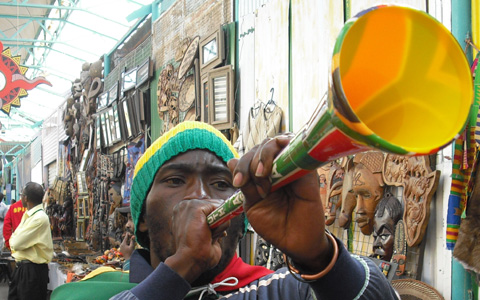By Thomas Peeters, Victor Matheson, and Stefan Szymanski
The World Cup, the Olympics, and other mega sporting events give cities and countries the opportunity to be in the world’s spotlight for several weeks, and the competition among them to host these events can be as fierce as the competition among the athletes themselves. Bids that had traditionally gone to wealthier countries have recently become a prize to be won by prospective hosts in the developing world. South Africa became the first African host of the FIFA World Cup in 2010, and this summer, Brazil is hosting the first South American World Cup in 35 years. Russia recently completed its first Winter Olympics in Sochi and will return to the international stage in 2018 when the World Cup heads to Eastern Europe for the first time.
On the surface, this might appear to be a leveling of the playing field, allowing developing countries to finally share in the riches that these events bring to their hosts. A closer look, however, shows that hosting these events is an enormously expensive and risky undertaking that is unlikely to pay off from a purely economic standpoint.
Because of the extensive infrastructure required to host the World Cup or the Summer or Winter Olympics, the cost of hosting these events can run into the tens of billions of dollars, especially for developing countries with limited sports and tourism infrastructure already in place. Cost estimates are often unreliable, but it is said that Brazil is spending a combined $30 billion to host the Olympics and World Cup, Beijing spent $40 billion on the 2008 summer games, and Russia set an all-time record with a $51 billion price tag on the Sochi games. Russia’s record is not likely to stand for long, however, as Qatar looks poised to spend upwards of $200 billion bringing the World Cup to the Middle East in 2022.

Our analysis of monthly tourist arrivals into South Africa during the months of the event, however, suggests that the tourist arrivals were even lower than this. The expected crowds and congestion associated with the tournament reduced the number of non-sports fans traveling to the country by over 100,000 leaving the net increase in tourists to the country during the World Cup at just 220,000 visitors. This figure is less than half that of Grant Thornton’s early projections and a full third below even the lowest visitor estimates provided after the tournament. We estimate that the cost to the nation per World Cup visitor lies in the range $4,700 to $13,000.
Our results provide a cautionary tale for cities and countries bidding for mega-events. The anticipated crowds may not materialize, and the economic gains from the sports fans who do come to watch the games need to be weighed against the economic losses associated from other potential travelers who avoid the region during the event.
Thomas Peeters is a PhD-fellow of the Flanders Research Foundation at the University of Antwerp. His main research interests are industrial organization and labor issues related to professional sports leagues. His work has been published in journals such as Economic Policy, the International Journal of Industrial Organization and the Journal of African Economies. Victor Matheson is a professor of economics at the College of the Holy Cross in Worcester, Massachusetts, USA. He is the author of numerous studies concerning the economic impact of major sporting events on host countries and is a member of the executive board of the North American Association of Sports Economists. Stefan Szymanski is the Stephen J. Galetti Professor of Sport Management at the University of Michigan. His research in the economics of sports includes work on the relationship between performance and spending in professional football leagues, the theory of contests applied to sports, the application of sports law to sports organizations, financing of professional leagues and insolvency, the costs and benefits of hosting major sporting events. They are the authors of the paper ‘Tourism and the 2010 World Cup: Lessons for developing countries’, which is published in the Journal of African Economies.
The Journal of African Economies is a vehicle to carry rigorous economic analysis, focused entirely on Africa, for Africans and anyone interested in the continent – be they consultants, policymakers, academics, traders, financiers, development agents or aid workers.
Subscribe to the OUPblog via email or RSS.
Subscribe to only business and economics articles on the OUPblog via email or RSS.
Image credit: South Africa fan in Johannesburg during World Cup 2010. By Iscar Blanco [Public domain], via Wikimedia Commons



Recent Comments
There are currently no comments.